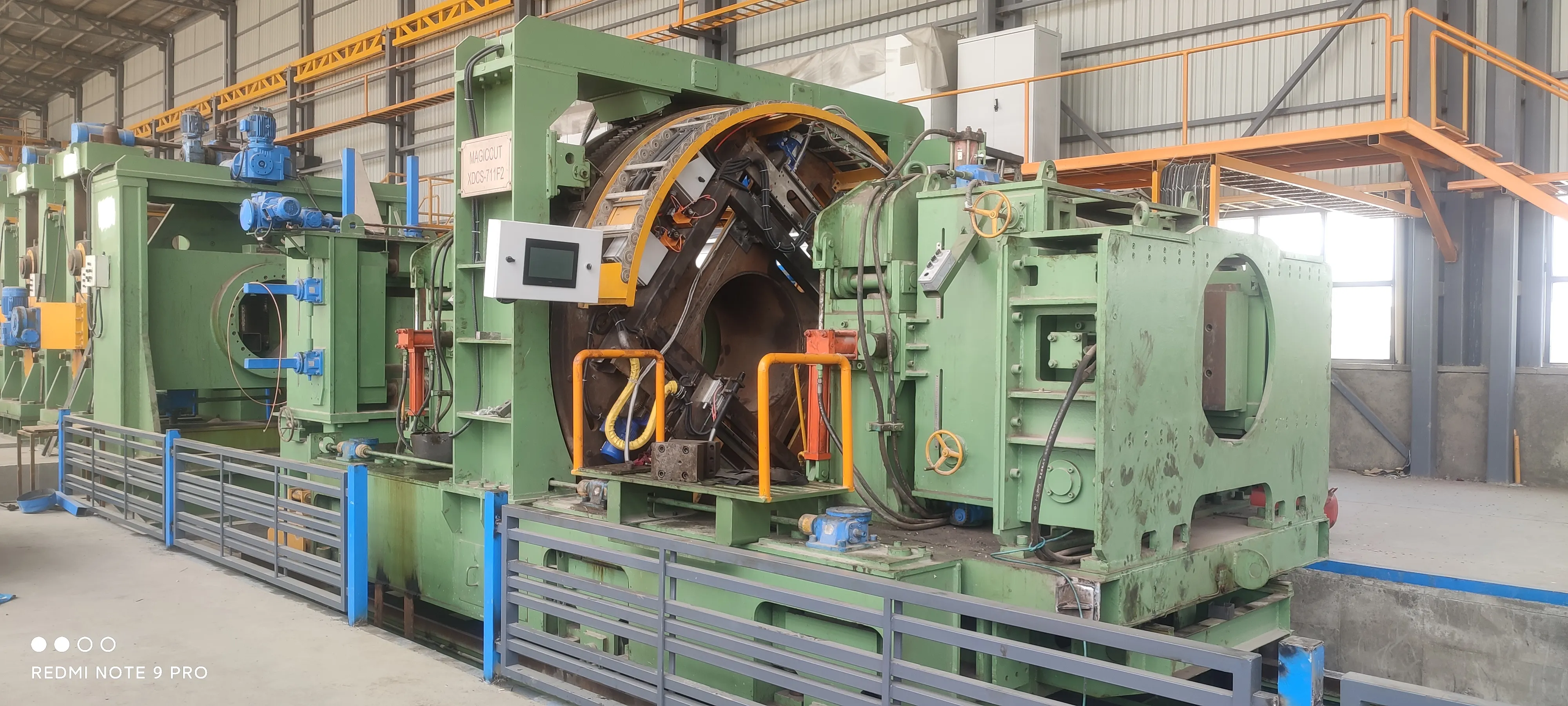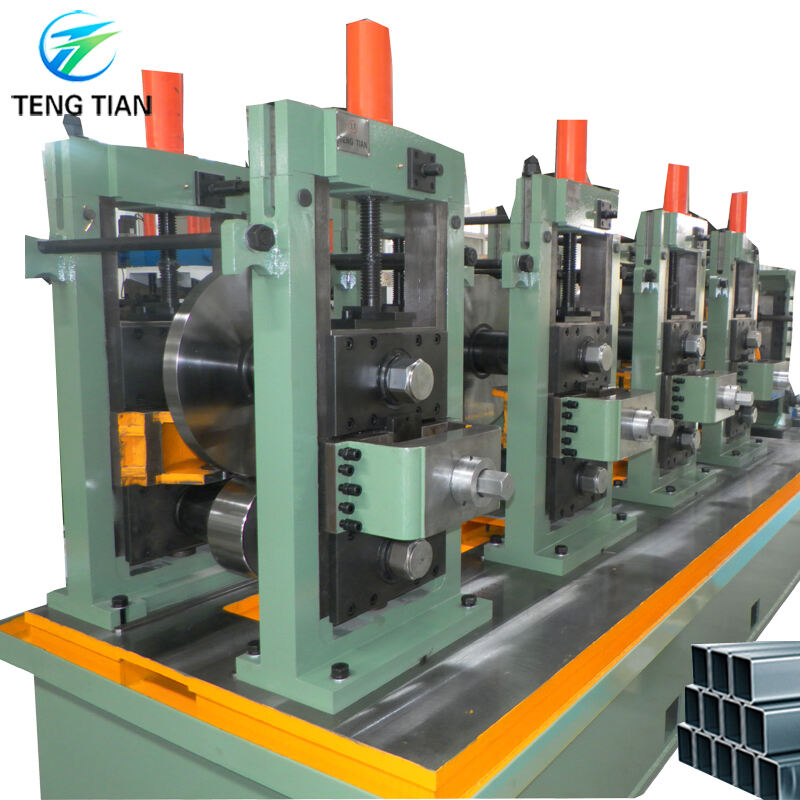درک برجستگی در تولید مدرن لوله
این خط تولید لوله ستون فقرات تولید صنعتی مدرن است، جایی که دقت و یکنواختی از اهمیت بالایی برخوردار است. این سیستمهای تولید پیشرفته، چندین مرحله از تولید، مکانیزمهای کنترل کیفیت و همچنین اتوماسیون پیشرفته را در یک سیستم یکپارچه ادغام میکنند تا لولههایی با مشخصات دقیق تحویل دهند. از کاربردهای خودرویی گرفته تا مواد ساختمانی، قابلیت اطمینان هر لوله از کارایی و دقت خط تولید آغاز میشود.
خطوط تولید لولههای مدرن، ترکیبی از فناوری پیشرفته و اصول تولید اثباتشده را برای حفظ استانداردهای بینقص کیفی به کار میگیرند. این سیستمها تمام مراحل را از آمادهسازی مواد اولیه تا بازرسی نهایی برعهده دارند و اطمینان حاصل میکنند که هر لوله از نظر تحمل ابعادی، شرایط سطحی و مشخصات استحکامی با استانداردهای سفت و سخت تطابق دارد.
اجزای اصلی سیستمهای پیشرفته تولید لوله
پردازش و آمادهسازی مواد اولیه
مسیر دستیابی به کیفیت بالای لولهها با انتخاب دقیق مواد و آمادهسازی آنها آغاز میشود. خط تولید لوله از سیستمهای پیشرفته دستانداز مواد استفاده میکند که از نظر ترکیب شیمیایی، خواص فیزیکی و وضعیت سطحی سیمهای فولادی یا ورقهای ورودی ارزیابی به عمل میآورد. مکانیسمهای پیشرفته تغذیه، جریان یکنواخت مواد را تضمین کرده و تجهیزات برش دقیق، موجودی را به دقت مطابق مشخصات آماده میکنند.
ایستگاه های آماده سازی مواد شامل واحدهای decoiling، مکانیسم های صاف کردن و سیستم های شرایط لبه است. این اجزای با هم هماهنگ کار می کنند تا مواد پایه را برای شکل دادن آماده کنند، از بین بردن متغیرهای که می توانند کیفیت لوله نهایی را به خطر بیندازند. سیستم های مدرن همچنین دارای چک کیفیت خودکار در این مرحله برای جلوگیری از مواد ناقص وارد فرآیند تولید هستند.
شکل دادن و جوش دادن
بخش شکل گیری خط تولید لوله نشان دهنده یک مرحله حیاتی است که در آن مواد صاف به اشکال لوله ای تبدیل می شوند. ایستگاه های شکل گیری رول با دقت بالا به تدریج مواد را از طریق مراحل پیشرفته شکل می دهند و کنترل ابعاد دقیق را در طول فرآیند حفظ می کنند. سیستم های سنسور پیشرفته به طور مداوم پارامترهای شکل گیری را نظارت می کنند و تنظیمات را در زمان واقعی انجام می دهند تا هندسه لوله سازگار را تضمین کنند.
در عملیات جوشکاری، فناوری پیشرفته تضمین میکند که همراستایی و نفوذ درز بهخوبی انجام شود. خطوط تولید لولههای مدرن از سیستمهای جوشکاری پیشرفتهای استفاده میکنند که کنترل دقیق دما را با قابلیتهای پیشرفته نظارت ترکیب میکنند. این سیستمها پارامترهای جوشکاری را بهصورت زنده دنبال میکنند و ورودی توان، سرعت و فشار را برای حفظ کیفیت بهینه جوشکاری تنظیم میکنند.

یکپارچهسازی و نظارت بر کنترل کیفیت
سیستمهای بازرسی خودکار
خطوط تولید لولههای مدرن از چندین لایه از سیستمهای بازرسی خودکار در سراسر فرآیند تولید استفاده میکنند. این سیستمها شامل دستگاههای اندازهگیری لیزری، آزمایش جریان گردابی، ایستگاههای بازرسی فراصوتی و سیستمهای نظارت بصری میشوند. هر نقطه بازرسی دادههای زندهای را درباره ابعاد لوله، کیفیت سطح و سلامت داخلی فراهم میکند.
ادغام الگوریتمهای هوش مصنوعی و یادگیری ماشین این امکان را فراهم میکند که این سیستمها تغییرات ظریف کیفی را شناسایی کرده و مشکلات احتمالی را قبل از تبدیل شدن به مشکلات جدی پیشبینی کنند. این قابلیت پیشبینی اجازه اقدامات اصلاحی فوری را میدهد و کیفیت یکنواخت لوله را حفظ میکند و در عین حال ضایعات و تاخیرهای تولید را به حداقل میرساند.
کنترل فرآیند و مستندسازی
خطوط تولید لوله مدرن، ضبطهای دیجیتال جامعی از تمام پارامترهای تولید و معیارهای کیفی را حفظ میکنند. سیستمهای کنترل فرآیند پیشرفته به طور مداوم متغیرهای تولید مانند فشار شکلدهی، پارامترهای جوشکاری و نرخهای خنککنندگی را نظارت و تنظیم میکنند. این رویکرد مبتنی بر دادهها کیفیت قابل تکرار را تضمین میکند و ردیابی کامل برای هر بچ تولیدی فراهم میکند.
روشهای کنترل فرآیند آماری روندهای تولید را تحلیل میکنند، امکانات بهینهسازی را شناسایی میکنند و استانداردهای کیفیت سفت و سخت را حفظ میکنند. این سیستم گزارشهای جامع کیفیت، اسناد گواهی و سابقههای تولید را تولید میکند و درخواستهای تضمین کیفیت و انطباق با مقررات را پشتیبانی میکند.
عملیات پرداخت و تکمیل سطح
فناوریهای بهبود سطح
خط تولید لوله دارای ایستگاههای پیشرفته پرداخت سطحی است که کیفیت بهینه پایانی و مقاومت در برابر خوردگی را تضمین میکنند. این سیستمها ممکن است از فناوریهای مختلفی مانند پردازش شیمیایی، پرداخت مکانیکی یا اعمال پوشش استفاده کنند. کنترل دقیق پارامترهای پردازشی، خواص یکنواخت سطحی را در تمامی دفعات تولید تضمین میکند.
عملیات پایانی پیشرفته ممکن است شامل سیستمهای اتوماتیک پولیش کردن، اپلیکاتورهای پوشش دقت بالا و ایستگاههای پخت در محیط کنترلشده باشد. این فرآیندها هم ظاهر و هم خواص عملکردی لولههای تولیدی را بهبود میدهند و به کیفیت و دوام کلی آنها کمک میکنند.
تایید کیفیت نهایی
قبل از ترک خط تولید لوله، هر لوله تحت آزمون نهایی کیفیت قرار میگیرد. این ارزیابی جامع شامل چک کردن ابعاد، بازرسی سطح و آزمونهای عملکردی است که در صورت لزوم انجام میشود. سیستمهای دستگیری اتوماتیک انتقال مراقبتشده لولههای تولیدی را فراهم میکنند و از آسیبهای دستگیری که ممکن است کیفیت را تحت تأثیر قرار دهد جلوگیری میکنند.
سیستمهای اندازهگیری پیشرفته پارامترهای مهمی مانند راستایی، گردی و یکنواختی ضخامت دیواره را تأیید میکنند. هرگونه لولهای که معیارهای تعیینشده را نداشته باشد بهصورت اتوماتیک جدا شده و برای ارزیابی بیشتر یا بازکاری مجدد ارسال میشود تا اطمینان حاصل شود که تنها محصولاتی که تمام استانداردهای کیفی را دارند به دست مشتریان میرسند.
سوالات متداول
عوامل اصلی موثر بر کیفیت لوله در تولید کدامند؟
عوامل اصلی موثر بر کیفیت لوله شامل یکنواختی مواد اولیه، دقت عملیات شکلدهی، پارامترهای جوشکاری و مؤثر بودن سیستمهای کنترل کیفیت میشود. خط تولید لوله این عوامل را از طریق سیستمهای نظارت و کنترل یکپارچه مدیریت میکند و این امر منجر به تضمین کیفیت یکنواخت در تمام دورههای تولید میشود.
اتوماسیون چگونه کیفیت تولید لوله را بهبود میبخشد؟
اتوماسیون با حفظ یکنواختی پارامترهای تولید، حذف خطاهای انسانی و امکان نظارت و تنظیم کیفیت در زمان واقعی، کیفیت لوله را افزایش میدهد. سیستمهای پیشرفته اتوماسیون در خطوط تولید لوله امروزی کنترل دقیقی بر تمامی جنبههای فرآیند تولید فراهم میکنند.
خطوط تولید لوله معمولاً با چه استانداردهای کیفیتی هماهنگ هستند؟
خطوط تولید مدرن لوله طوری طراحی شدهاند که استانداردهای بینالمللی تولید مانند ISO 9001 و همچنین الزامات خاص صنعتی مانند ASTM، API و مشخصات EN را برآورده میکنند. این سیستمها شامل اقدامات کنترل کیفیت و فرآیندهای اسنادی هستند تا انطباق با استانداردهای مربوطه و مشخصات مشتری را تضمین کنند.

